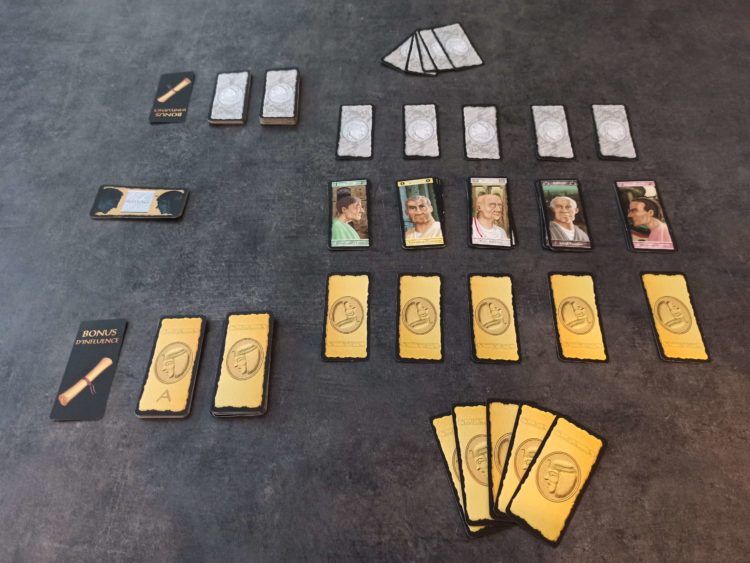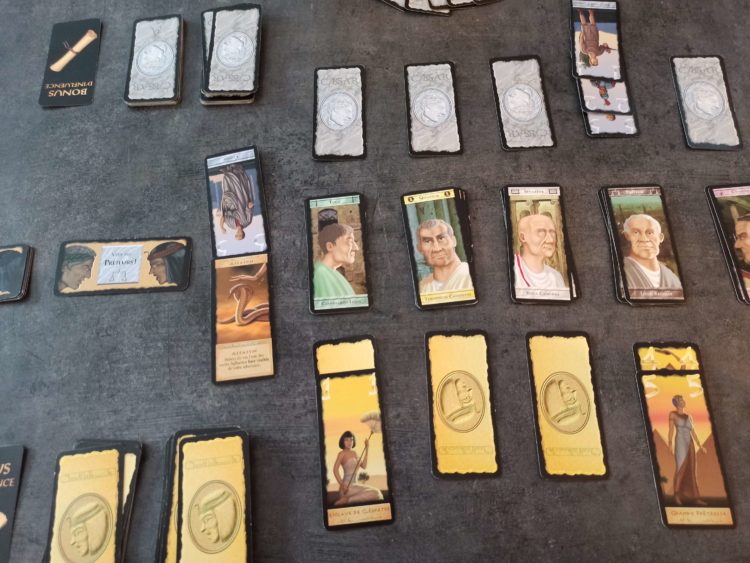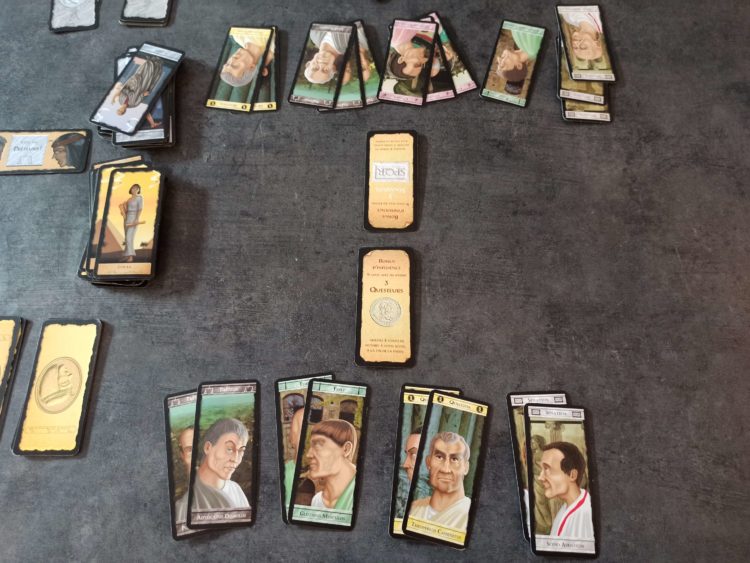
OBJECTIVE OF CAESAR & CLEOPATRA: The objective of Caesar & Cleopatra is to win the support of more Patricians by influencing them.
NUMBER OF PLAYERS: 2
MATERIALS: 135 cartes, dont:
- 35 Forum cards
- 21 Patrician cards (5 Senator, 5 Quaestor, 5 Praetor, 3 Censor and 3 Aedile)
- 8 Vote of Confidence cards
- 6 Bonus Goal cards
- 50 Roman cards: 37 Influence cards and 13 Action cards
- 50 Egyptian cards: 37 Influence cards and 13 Action cards
TYPE OF GAME: majority influence duel game
AUDIENCE: teen, adult
OVERVIEW OF CAESAR & CLEOPATRA
Caesar and Cleopatra fought a battle for influence in the Roman Senate, each trying to win the support of more Patricians than the other in the regular elections. Whoever ultimately has the most Patricians will control the Senate, and the Empire…
SETUP
1. Constitution of the Forum
Sort the 35 Forum cards, then separate the 21 Patrician cards into 5 groups, placed next to each other in the centre of the table. The order of the cards within a group is not important. Then shuffle the 8 Vote of Confidence cards and place them face down next to the Patrician cards.
2, Party constitutions
One player plays with Roman cards (Caesar), the other with Egyptian cards (Cleopatra). Each deck consists of two types of cards: Influence cards (with a number or a P in the corner) and Action cards (with an A on the back). Each player takes 10 cards (two sets of cards numbered from 1 to 5) from the 37 Influence cards and sets them aside. The remaining cards are shuffled and placed in front of the player: these cards form the first reserve pile. Each player then takes their 13 Action cards and sorts them in any order they wish, and places them in front of them, next to pile 1, to form reserve pile 2. These two piles shall no longer be looked at or shown.
3. Bonus Goal Cards
The 6 Objective Bonus cards are shuffled, and each player chooses a card at random, the contents of which are, of course, kept secret. The 4 remaining cards are put back in the box without being shown.
4. Placement of the first Influence cards.
Each player takes the 10 Influence cards they had set aside, then places 5 cards face down (with the values numbered 1 to 5) on their side of the Patrician cards, one card per group. Each player is free to choose which card he places in front of which group. Finally, the players take the 5 remaining cards in their hands.

The player playing Cleopatra always starts first, then the players take turns. The current player has two possibilities:
- A. It decides to be active
- B. It decides to remain passive
Actions of an active player
A player who decides to be active performs the following actions:
- he must put down one or two Influence cards
- he can play an Action card
- he must complete his hand
- he must draw a Vote of Confidence card
A.1. Play one or two Influence cards
The player places 1 or 2 Influence cards in front of him:
- either 1 card face down in front of the group of Patricians of his choice
- or 2 cards face up in front of one or two groups of his choice.
Rules to follow:
- A player can always look at his own face down Influence cards.
- A group of Patricians cannot have more than 5 Influence cards on one side.
- A group of Patricians cannot have more than 8 Influence cards in total.
A.2. Playing an Action card
The player may play an Action card at any time during his turn, but before drawing a Vote of Confidence card (even during the resolution of an Exceptional Vote of Confidence). Apply the effects of the Action card, then discard it.
A.3. Completing the hand
When the player has played all the cards he wanted, he refills his hand so that he always has 5 cards. If at that moment there are 8 Influence cards in front of a group of Patricians, an Exceptional Vote of Confidence is performed.
A.4. Drawing a Vote of Confidence card
At the end of his turn, the player turns over the top card from the Vote of Confidence deck.
- If the card indicates a group of Patricians, the Vote of Confidence is resolved (See Resolving a Vote of Confidence).
- If the card says “Orgy”, there is no vote. In addition, one of the Orgy cards asks you to reshuffle the discarded Vote of Confidence cards in the Vote of Confidence deck.
The discarded card is then discarded next to the Vote of Confidence deck.
Actions of a passive player
A passive player can only discard cards from his hand, and draw the same number from either of his draw piles. There is no Vote of Confidence.
Once a player’s turn is over, it is the next player’s turn.
Resolving a Vote of Confidence
A Vote of Confidence occurs if:
- a group of Patricians received 8 Influence cards (this is an Exceptional Vote of Confidence)
- a player has drawn a Vote of Confidence card designating one of the groups of Patricians
Vote of Confidence is solved this way:
- The Influence cards in front of the group of Patricians are turned face down.
- The points of influence of the cards placed by each player in front of the group of Patricians are added up.
- The player with the most influence wins: he takes a Patrician card from the group and puts it face up, next to him (special case: if there is a Philosopher, this rule is reversed, the weaker player wins).
- discarding:
- The player with the most points discards the highest card he has played on the group.
- The player with the fewest points discards the lowest card he has played on that group.
- All the other cards that had been played on this group remain in place, face up.
- If there is a tie between the two players, all Influence cards remain in place until a new Vote of Confidence takes place.
Remarks:
- During an Exceptional Vote of Confidence, equality can only be solved by using an Action Card (see description of Action Cards in Chapter 7). No Influence card can, of course, be added to the group subject to vote.
- if, after a Vote of Confidence, the last card in a Patrician group is won by a player, all remaining Influence cards in that group are discarded. If a Vote of Confidence card subsequently designates a group that is no longer present, it is ignored. The player removes this card from the deck (puts it back in the box) and draws the next Vote of Confidence card.

The Philosopher card
This special card is played like any Influence card next to a group of Patricians (face down or face up). When a Philosopher card is one of the Influence cards played during a Vote of Confidence, the philosopher reverses the result: the player with the least influence wins! The player with the most influence points, even if he has lost, still discards his strongest card in play in the group. The Philosopher card(s) must also be discarded, unless there is a tie.
Remarks:
- If the players are tied in influence, the cards remain uncovered, including the Philosopher card(s).
- a Philosopher has a value of 0, which can lead
- to equality if there are only Philosophers on each side
- to a victory of the Philosopher if there is more than 0 in influence on the opposite side of the group
- if each player has played a Philosopher card, the Philosopher cards cancel each other and the player with the most influence wins again.
- If there is one Philosopher card on one side and two on the other side, one Philosopher card is discarded on each side, and the player with the least influence thus wins the Vote of Confidence.
- If a player has played two Philosopher cards and his opponent has played none, both cards count as one (they do not cancel each other).
- in all of the above cases, when a Vote of Confidence has been resolved otherwise than by a tie, all Philosophers are discarded
The Action Cards
Each player has 13 Action cards. An active player can play one, and only one, on his turn. There are 6 types of Action cards.
- Assassin (4 cards): Remove and discard an Influence card from your opponent that is face-up on the table.
- Spy (2 cards): Look at the cards in your opponent’s hand, and choose a card to discard. He must immediately draw a card from one of his draw piles.
- Roman Roque / Egyptian Roque (2 cards): Take all the influence cards you have placed on two groups of Patricians, then redistribute these cards between these two groups, face down. You may put nothing on one of the two groups, but you must respect the rules of maximum number of cards per group.
- Courtesan (2 cards): Flip all cards face down placed by your opponent on a group of Patricians. The cards must then remain face up.
- Wrath of the Gods (1 card): Remove and discard all Influence cards present on both sides of a group of Patricians.
- Veto of Caesar / Cleopatra (2 cards): Play this card (outside your normal turn) to cancel an Action card played by the opponent. Discard both cards, then draw a card. A Veto card cannot cancel another Veto card.
END OF GAME
Two situations may trigger the end of the game:
- All the Patricians have been won by the players.
- Both players no longer have any Influence cards.
Special cases:
- If only one of the two players still has cards, he or she continues to play alone, but can no longer draw cards. When he has played his last cards in hand, the game ends.
- Patrician cards that have not been won are not taken into account when determining the winner.
Victory point count:
- Each Patrician won earns 1 victory point.
- Possessing the majority in a Patrician group earns 1 point (applies only if all Patricians in that group have been awarded).
- Possessing all Patricians in a group earns 1 point (applies even if not all Patricians have been awarded).
- Succeeding in your Bonus Goal earns 2 points
Victory points and bonuses can be granted by the same group of Patricians. The player with the most points wins the game. In the event of a tie, the player with the most Patricians wins.

Enjoy! 😊
VARIATIONS
Tips for beginners
To master the game, it is necessary to learn the Action cards, which can be done only by playing. Therefore, in the first few games, you can simply shuffle the Action cards, rather than choosing their order.
- Comprehensive Guide to the Board Game Go (weiqi, baduk) - January 23, 2024
- Are Creative Suites Changing Gaming - October 30, 2023
- How Classic Games Have Been Reimagined for Modern Audiences - October 5, 2023